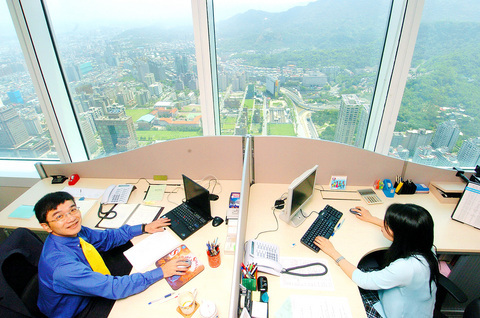The world's highest skyscraper, Taipei 101, yesterday welcomed the Bayer Group as its first tenant and is preparing for its second tenant, Swiss insurer Winter Life, to move in later this month.
Bayer, which is Germany's second-largest chemical and drug maker, will locate its Taiwan headquarters on the tower building's 53rd and 54th floors. The new office space accommodates about 230 of Bayer Taiwan's employees.
"We like this building very much, and believe it is the safest place to work, with the high-tech infrastructure and design," said Elmar Stachels, chief executive officer of Bayer's Greater China region, during the moving-in ceremony yesterday.

PHOTO: CHANG CHIA-MING, TAIPEI TIMES
With a five-year lease, Bayer believes the move will help it attract domestic and international businesses, as well as bolster its business in Taiwan, Stachels said.
Future tenants
Winter Life will relocate its Taiwan branch to Taipei 101 next Monday, said Harace Lin (
Other future tenants include Peoples' King International Co, D.B. Zwirn Advisors Taiwan and the Taiwan Stock Exchange Corp (TSE). The TSE is currently the largest tenant, holding the 9th to the 12th floors. It will move in by year's end.
Now that the first tenant has commenced operations in the building, more potential customers waiting on the sidelines will be more interested in exploring leasing options, said Calvin Wang (王治平), managing director of Jones Lang LaSalle International Property Consultants, the leading leasing agent for the skyscraper.
Currently, the occupancy rate at Taipei 101 is still about 35 percent for the 58,000-ping office space, but Wang is confident that the building will be 60 percent to 70 percent full by the end of the year, and next to full by the end of next year.
"Many companies have shown strong interest in making Taipei 101 their address these days, [giving it] prestige like the Empire State Building in New York City," Wang said.
As for the safety concerns of some prospective tenants following several accidents during the tower's construction, Wang said doubts had been dissolved now that the building had withstood several major earthquakes. As a result, current tenants were more interested in renting higher levels of the building.
Strict controls on access would also give confidence to customers, Wang said.
Floor pass
Taipei 101 utilizes the Visitor Access Kiosk System developed by Siemens AG, which enables visitors to key in the floor or company they want to visit.
With confirmation by the tenant, the visitor receives a pass allowing entry through a security door.

MULTIFACETED: A task force has analyzed possible scenarios and created responses to assist domestic industries in dealing with US tariffs, the economics minister said The Executive Yuan is tomorrow to announce countermeasures to US President Donald Trump’s planned reciprocal tariffs, although the details of the plan would not be made public until Monday next week, Minister of Economic Affairs J.W. Kuo (郭智輝) said yesterday. The Cabinet established an economic and trade task force in November last year to deal with US trade and tariff related issues, Kuo told reporters outside the legislature in Taipei. The task force has been analyzing and evaluating all kinds of scenarios to identify suitable responses and determine how best to assist domestic industries in managing the effects of Trump’s tariffs, he

TIGHT-LIPPED: UMC said it had no merger plans at the moment, after Nikkei Asia reported that the firm and GlobalFoundries were considering restarting merger talks United Microelectronics Corp (UMC, 聯電), the world’s No. 4 contract chipmaker, yesterday launched a new US$5 billion 12-inch chip factory in Singapore as part of its latest effort to diversify its manufacturing footprint amid growing geopolitical risks. The new factory, adjacent to UMC’s existing Singapore fab in the Pasir Res Wafer Fab Park, is scheduled to enter volume production next year, utilizing mature 22-nanometer and 28-nanometer process technologies, UMC said in a statement. The company plans to invest US$5 billion during the first phase of the new fab, which would have an installed capacity of 30,000 12-inch wafers per month, it said. The

Taiwan’s official purchasing managers’ index (PMI) last month rose 0.2 percentage points to 54.2, in a second consecutive month of expansion, thanks to front-loading demand intended to avoid potential US tariff hikes, the Chung-Hua Institution for Economic Research (CIER, 中華經濟研究院) said yesterday. While short-term demand appeared robust, uncertainties rose due to US President Donald Trump’s unpredictable trade policy, CIER president Lien Hsien-ming (連賢明) told a news conference in Taipei. Taiwan’s economy this year would be characterized by high-level fluctuations and the volatility would be wilder than most expect, Lien said Demand for electronics, particularly semiconductors, continues to benefit from US technology giants’ effort

‘SWASTICAR’: Tesla CEO Elon Musk’s close association with Donald Trump has prompted opponents to brand him a ‘Nazi’ and resulted in a dramatic drop in sales Demonstrators descended on Tesla Inc dealerships across the US, and in Europe and Canada on Saturday to protest company chief Elon Musk, who has amassed extraordinary power as a top adviser to US President Donald Trump. Waving signs with messages such as “Musk is stealing our money” and “Reclaim our country,” the protests largely took place peacefully following fiery episodes of vandalism on Tesla vehicles, dealerships and other facilities in recent weeks that US officials have denounced as terrorism. Hundreds rallied on Saturday outside the Tesla dealership in Manhattan. Some blasted Musk, the world’s richest man, while others demanded the shuttering of his